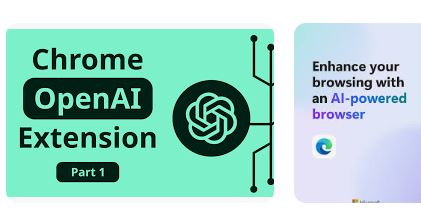15 AI Browsers to Transform Your Web Browsing Experience
The evolution of web browsers has led to the rise of AI-enabled platforms. These browsers now serve as intelligent companions, transforming our interactions on the internet.
They adapt to users’ needs, providing a tailored and more engaging online environment.
By blending machine learning with conventional browsing, these advanced tools streamline web navigation.
AI browsers now offer features that make information access swift and intuitive, redefining how individuals engage with digital content.
Leading AI Browsers with AI Capabilities to Consider
1. Microsoft Edge with Bing AI
Edge by Microsoft stands out in the world of AI-enabled browsers. With its integration of Bing AI, it provides a smooth browsing experience that feels innovative.
Users can interact with Bing’s AI to summarise web content or even PDFs, enhancing how information is engaged with and understood.
Pros:
- Seamless integration with Bing AI.
- Offers both Chat and Compose modes.
- Efficient at summarising both web content and PDFs.
Cons:
- Less popular than more established browsers like Chrome.
2. Courageous Browser
Courageous Browser has made its mark with a strong emphasis on user privacy.
It offers an ad-free browsing experience along with its own search engine, known as Courageous Search.
This search engine includes the new Summariser feature, which quickly provides summaries of search results, making it easy for users to find significant information.
Pros:
- The Summariser provides brief overviews of results.
- Focus on maintaining user privacy.
- Delivers timely and pertinent information.
Cons:
- The Summariser isn’t effective with all search enquiries.
- Needs further development to improve.
3. SigmaOS
Developed on the Chromium platform, SigmaOS has drawn attention for its sleek design and robust tab management.
It includes an AI assistant named Airis that gives insights based on the web pages currently viewed.
This makes SigmaOS a worthy player in the AI browser scene.
Pros:
- Controlled tab management.
- Contains built-in AI assistant, Airis.
- Sophisticated design appeal.
Cons:
- Airis is available to a select group of users.
4. Opera One AI Browser
Opera One AI Browser is a pioneer in blending AI with web browsing. With a modular design, it offers seamless animations and transitions.
Its combination with ChatGPT and ChatSonic redefines the browsing experience, transforming Opera One into a browser that doubles as a smart assistant.
Pros:
- Suggestion tool for enhanced user interaction.
- ChatSonic delivers refined results.
- Visually attractive interface.
Cons:
- Still in early access; no Android version currently.
5. Google Chrome with Bard AI
Google Chrome remains one of the most popular browsers, and with the integration of Bard AI, it takes web searching to another level.
Bard AI assists in refining search queries and generating personalised recommendations.
Pros:
- Fast, reliable, and widely supported.
- Bard AI offers advanced search refinement.
- Seamless integration with Google’s suite of services.
Cons:
- High memory consumption.
- Data privacy concerns due to Google’s tracking policies.
6. Opera Browser with Aria AI
The revamped Opera Browser revolutionises AI browsing with features inspired by the Opera One Browser.
Its major selling point is ARIA, a native AI assistant supported by OpenAI.
ARIA can comprehend the currently displayed pages, providing users with up-to-date information and making it an ideal choice for a smart browsing environment.
Pros:
- Integrates a ChatGPT-based assistant, ARIA.
- Free for use with current knowledge capabilities.
- Available on both desktop and mobile devices.
- Free VPN and ad blocker.
- AI-based sidebar features for multitasking.
- Customisable AI assistance based on preferences.
Cons:
- Requires a user login into an Opera account.
- Page comprehension not supported on all sites.
- May not support all extensions.
- Some users report slower speeds compared to competitors.
7. Wavebox
Wavebox draws its strength from productivity-focused features while positioning itself in the AI browser market.
With an array of features, including a focus mode and split screen view, it integrates AI through its Brainbox chatbot.
This commitment to AI is further highlighted by offering options among different ChatGPT models, thus appealing to users who appreciate an adaptive browsing experience.
Pros:
- Offers flexibility with different ChatGPT models.
- Includes practical features like focus mode and split view.
- Enables easy access to AI tools.
Cons:
- Advanced models need a Pro version upgrade.
8. OperaGX Browser with ChatGPT Features
Recognised for its appeal to gamers, OperaGX is also a formidable AI browser with the addition of ChatGPT and ChatSonic.
This creates opportunities for engaging conversations and creative authoring.
Its AI prompt tool further enriches the browsing experience by offering the ability to summarise or create content like tweets or memes, helping users to blend entertainment with productive browsing.
Pros:
- AI chatbot integration for immersive interactions.
- Prompt tool assists in content crafting.
- Enhanced gaming experience with AI features.
Cons:
- AI prompt tool function is limited on certain sites.
9. Mozilla Firefox with Enhanced AI Tools
Mozilla Firefox has incorporated various AI tools, such as recommendation engines and intelligent search features, all while maintaining its open-source and privacy-focused ethos.
Pros:
- Open-source with a strong focus on user privacy.
- AI-powered tools without compromising speed or security.
- Extensive customisation options and support for a wide range of extensions.
Cons:
- Not as fast as competitors.
- Fewer native AI features compared to Chrome or Edge.
10. Safari with Apple’s AI Integration
Apple’s Safari browser comes equipped with AI integration that powers its intelligent tracking prevention and predictive search tools, providing a smoother browsing experience.
Pros:
- Low energy consumption on Apple devices.
- Advanced privacy features like Intelligent Tracking Prevention.
- Fast and secure browsing.
Cons:
- Limited to Apple ecosystem.
- Fewer customisation options compared to other browsers.
11. Brave Browser with AI Search
Brave is a privacy-focused browser that has integrated its AI-powered search tool, providing users with more relevant and contextual search results without compromising privacy.
Pros:
- Strong focus on privacy and security with built-in tracker blocking.
- No ads and faster load times.
- AI search tool that provides results based on user habits.
Cons:
- Limited features compared to other browsers.
- Some website compatibility issues.
12. Neeva AI Browser
Neeva is a new player in the AI browser space, offering an ad-free, subscription-based experience.
Its AI tools allow for more refined searches and personalisation without data mining.
Pros:
- Ad-free and privacy-focused.
- AI-driven search results tailored to individual preferences.
- No tracking or data selling.
Cons:
- Subscription-based model may deter casual users.
- Limited market availability.
13. Vivaldi Browser with AI Widgets
Vivaldi is highly customisable, and with its AI widget integration, users can create a tailored browsing experience with AI-powered productivity tools and search enhancements.
Pros:
- Highly customisable interface.
- AI widgets for productivity.
- Integrated privacy tools, such as tracker blockers and encrypted browsing.
Cons:
- Can be overwhelming for users who prefer simplicity.
- Slower than some competitors.
14. Ghostery Dawn with AI Privacy Features
Ghostery Dawn is an AI-powered privacy browser with built-in ad blockers and anti-tracking tools.
It’s ideal for users concerned about data privacy and online tracking.
Pros:
- AI-driven anti-tracking features.
- No ads and improved page load speeds.
- Excellent privacy controls.
Cons:
- Not as feature-rich as competitors.
- Limited extension support.
15. Tor Browser with AI Privacy Enhancements
Tor Browser takes privacy to the next level by routing traffic through the Tor network.
Its AI-enhanced tools help improve anonymity and security when browsing.
Pros:
- Unparalleled privacy and anonymity.
- AI features to prevent online tracking and surveillance.
- Secure access to the dark web for advanced users.
Cons:
- Slower browsing speeds due to encryption layers.
- Limited mainstream features.
Which AI-integrated Browser Excels?
Microsoft Edge’s Assistant
Microsoft Edge offers an AI assistant that is highly integrated for tasks such as chatting, summarising content, and helping with writing.
As it often comes pre-installed on Windows devices, it provides user-friendly access. It serves as both a research aide and a writing mentor.
Brave’s AI Support
Brave’s built-in AI focuses heavily on maintaining user privacy while answering queries, translating text, and summarising web pages. Known for its ability to block ads and trackers, this browser is a comprehensive tool for those prioritising privacy.
Opera’s Creative AI
Opera enhances user experience with Aria, a tool that facilitates chats, translations, and creative writing.
Positioned as a supportive companion for language translation and creative tasks, it offers a unique mixture of ease-of-use and creative aid.
Arc’s Productivity Assistant
Arc’s assistant, named Max, boosts productivity with its features designed for web page previews and organisation.
Available for free on macOS, with plans for Windows support, it targets productivity-focused users who seek efficient browsing solutions.
Which Browser Includes Integrated ChatGPT?
Opera offers a unique feature by having a built-in ChatGPT directly within the browser.
This integration enables users to access ChatGPT’s abilities effortlessly, enhancing the browsing experience.
Such a setup makes Opera appealing to individuals who wish to utilise AI capabilities without needing separate apps or extensions.
Optimal Browser for GPT
For accessing ChatGPT, most browsers allow users to navigate the site comfortably. Nonetheless, Google Chrome and Arc Max stand out for their performance and seamless AI integration.
Google Chrome is favoured for its vast selection of extensions and reliable speed, making it a top pick among AI browsers.
On the other hand, Arc Max is ideal for those who value productivity and organisation, thanks to its user-friendly interface designed for efficient work.
Both browsers offer unique benefits that make them excellent choices for anyone looking to make the most of AI-powered browser features and ChatGPT interactions.
Final Insights on AI Browsers
The technological advancements in web browsers are increasingly influenced by artificial intelligence.
Among the most prominent options is Microsoft’s Edge. It leverages Bing AI and enhances user experience by allowing users to interact with the AI for tasks such as summarising web pages.
Another notable AI browser is Opera One. With the introduction of Aria, a native AI, its modular design provides an innovative browsing experience.
It stands as a significant development in the digital landscape.
The Brave browser highlights privacy while integrating AI capabilities. Known for its strong focus on blocking ads and trackers, it presents itself as a secure alternative for internet users who prioritise privacy.
These browsers represent a shift in how users engage with the internet, signifying a future where artificial intelligence plays a central role in enhancing digital interactions.
Each browser, with its unique features, contributes to a more efficient and personalised online experience.




















